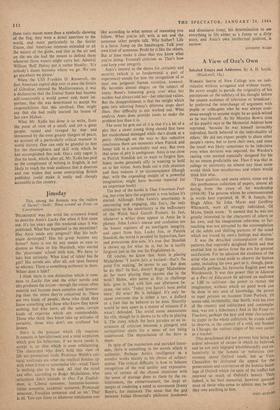A View of One's Own
Selected Essays and Addresses. By A. H. Smith. (Blackwell, I 8S.) WARDEN SMITH of New College was an indi- vidualist without arrogance and without vanity.
He never sought to parade the originality of his perceptions or the subtlety of his thought before the unseen audience of television or broadcast: he preferred the interchange of argument with pupils or colleagues who he was always cour- teous enough to assume might be as quick-witted as he was himself. As Sir Maurice Bowra (one of his pupils) says in the Memorial Address here reprinted, 'because he was himself invincibly individual Smith believed in the individuality of others.' He did not expect people to share other people's views, but to form their own, and since the result was likely sometimes to be indecisive even when decision was required, the Warden's casting vote seemed especially designed for his by no means predictable use. Thus it was that in college or university on almost any issue some would think him mischievous and others would think him wise.
These qualities, and many others, come out in this posthumous collection of papers, almost all dating from the years of his wardenship (1944-58). The persons whom he commemorated in words here reprinted, H. W. B. Joseph, Sir Hugh Allen, Sir John Myres and Geoffrey Whitworth, were all strongly individual. Of Myres, Smith wrote: `It seemed that he was not greatly interested in the characters of others or his own, and his imagination otherwise so far- reaching was not attracted by the contemplation of the subtle and shifting patterns of the mind which are traced by men's feelings and desires.'
It was the detached contemplation of these patterns that especially delighted Smith and that enabled him to derive from the arts his greatest satisfaction. For he admired the aloofness of the artist who can stand aside to observe the human scene, including his own part in it, though, para- doxically perhaps, his favourite English poet was Wordsworth. It was this power that in Idleness as a Part of Education he advised an audience at LSE to cultivate-- the power to recruit the imagination, without which no good work can be done in any area of knowledge, the power to repel persons on business from Porlock. (It seems odd, incidentally, that Smith, with his love of the country and solitariness and contempla- tion, was not a fisherman.) And in the Essay on Teachers„ perhaps the best and most characteris- tic paper in the whole collection, he stands aside to observe, in the context of a cold, wet Sunday in Chicago, the various stages of his own career as a teacher.
This detachment did not prevent him being an ardent advocate of causes in which he believed, and he not only engaged wholeheartedly and ex- haustively in the famous or notorious con- troversy about Oxford roads, but as Vice- Chancellor he instituted the appeal for the preservation and restoration of the historic build- ings of Oxford which (in spite of the traffic) has renewed so much of Oxford's beauty. That, indeed, is his best memorial, however ignorant most of those who come to admire may be that they owe anything to him.
]OHN BUXTON


































 Previous page
Previous page